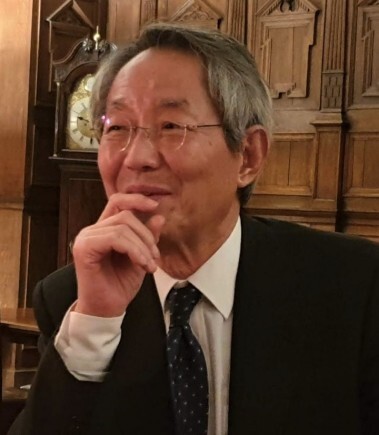*Editor’s note: K-VIBE invites experts from various K-culture sectors to share their extraordinary discovery about the Korean culture.
Doc. Earm’s ‘K-Health’: Health Should Be Studied Like Academics (Part 2)
By Yung E. Earm (Professor Emeritus, Department of Physiology, College of Medicine, Seoul National University; Research Fellow, Department of Physiology, Anatomy and Genetics, University of Oxford )

"Are You All in Good Health?"
Talking about health is easy. Ask most people, “What does it mean to be healthy?” and they’ll often say, “It means not having any diseases.”
But that’s only partially true. According to the World Health Organization (WHO), health is defined as “a state of complete physical, mental and social well-being and not merely the absence of disease or infirmity.”
This means that unless all three conditions—physical, mental, and social well-being—are met, one cannot be considered truly healthy.
Let’s begin with the most apparent aspect: physical health. Until now, our society has interpreted health in a very passive sense—believing that if you need treatment at a hospital, you’re sick, and if you don’t, then you’re healthy. But is there really a clear boundary between being sick and not being sick?
Not quite. Statistically, only about 15% of people are in a state of complete health, where they feel perfectly fine and no abnormal findings appear in any medical test.
About 35% of the population either has a diagnosed illness or suffers from some physical discomfort—they take medications or receive treatment for specific conditions. The remaining 50% don’t have a diagnosable disease but still feel unwell in some way.
For instance, they may not feel light and energetic upon waking, or lack vitality throughout the day. Doctors refer to this state as “Mibyeong” (未病), a Korean term meaning “not a disease, but not healthy either.”
The most commonly reported symptom among people in this Mibyeong state is fatigue. Despite medical exams showing no abnormal results, they feel persistently tired. Other symptoms include minor pain, poor sleep, indigestion, depression, irritability, and anxiety.
So, how can we help those in the Mibyeong state return to good health?
I believe government health policy should focus on this issue. But what does our current public health policy look like?
Right now, it's solely focused on treating the 35% who are already sick. All attention is on how to reduce the national health insurance costs for each disease.
There is virtually no consideration for how to promote the true health of the people—that is, a harmonious balance of physical, mental, and social well-being.
◇ Why Do We Get Sick?
Why do we fall ill? Why does someone who seems perfectly healthy suddenly get sick and suffer?
Traditionally, people believed illness was caused by specific triggers—like germs, aging, or external stimuli. That’s true to an extent.
But external factors alone cannot fully explain all diseases.
Genetics is another cause—some illnesses are congenital. However, lifestyle-related diseases are far more prevalent and serious.
A prime example is smoking-related illness. In recent years, environmental factors have become increasingly important. The air you breathe, the water you drink, the food you eat daily, your educational and family environment, and even national issues—these all influence your health.
New problems have also emerged with the development of information and communication technology. A prominent example is confusion between virtual and real life or gaming addiction. When the WHO recently classified gaming addiction as a disease, it stirred considerable debate.
These issues are closely related to social well-being. You can't be healthy by individual effort alone. Your health is affected by the condition of your family, community, and society.
The most critical factor determining whether you get sick is your resistance—your immune strength. If your immune system is strong, you're less likely to fall ill.
Take the flu season, for example. Just because the flu is going around doesn’t mean everyone gets sick.
Some people stay well despite exposure. People often think that exposure to a virus automatically causes illness, but those with strong immunity don’t get sick even if they’re exposed.
Most people treat the common cold lightly, but we should take it more seriously. For people with weakened immunity—especially the elderly—a cold can become the starting point of many serious illnesses.
Finally, there’s one factor that even modern medicine can’t fully explain: luck. Sometimes, good fortune allows people to avoid illness even if their resistance isn't particularly strong.
For this reason, we still can’t say that medical science has completely explained why people get sick.
◇ The Absence of Disease Is Not the Same as Being Healthy
Earlier, I mentioned that health encompasses both physical and mental aspects. In fact, the body and mind are deeply connected. When the body is in pain, the mind suffers. Conversely, emotional wounds can manifest as physical illness.
A physician in Switzerland once placed an ad in newspapers worldwide:
“I can cure cancer.”
What he actually treated was the mind. Believing that emotional pain can lead to cancer, he focused on healing the psychological wounds of his patients. Of course, he didn’t cure all cancers, but his approach illustrated the connection between body and mind.
So far, we’ve mostly talked about how individuals can lead healthy lives by eating well, exercising regularly, improving lifestyle habits, and managing stress.
On top of that, there’s another increasingly important factor that’s difficult for individuals to handle alone: the environment. Environmental issues are emerging as a major cause of illness—and they demand collective attention.
(to be continued)
(C) Yonhap News Agency. All Rights Reserved





















![[풀영상] 2025 MBC 방송연예대상 레드카펫|유재석·전현무·기안84·김연경·세븐틴 부승관·박지현·제베원(ZB1) 규빈·투어스(TWS) 도훈·주우재·하하 외](/news/data/20251229/p179586605817354_616_h.jpg)











